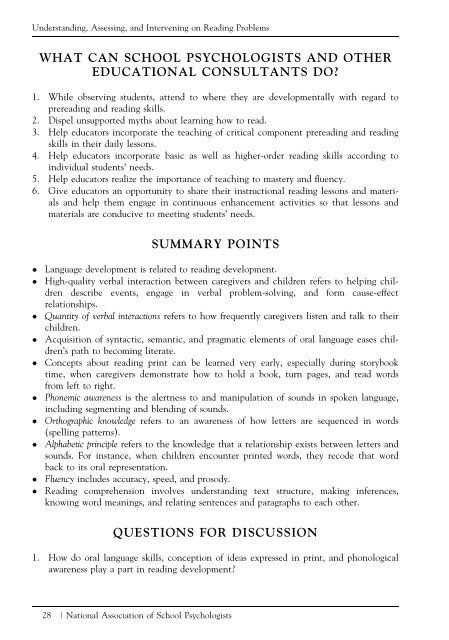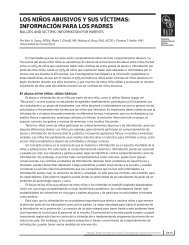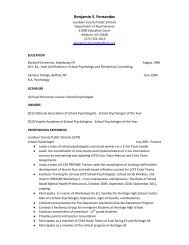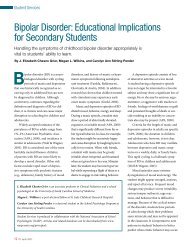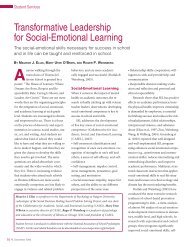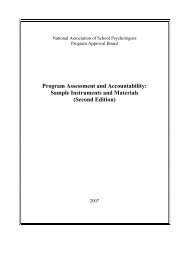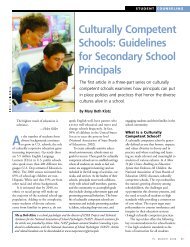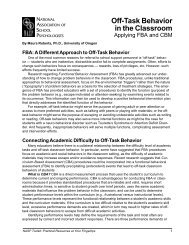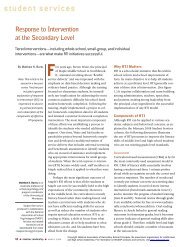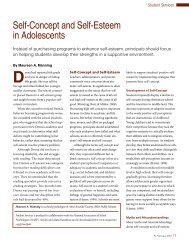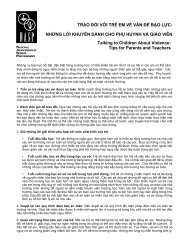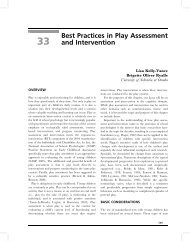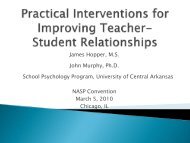Chapter 1 - National Association of School Psychologists
Chapter 1 - National Association of School Psychologists
Chapter 1 - National Association of School Psychologists
You also want an ePaper? Increase the reach of your titles
YUMPU automatically turns print PDFs into web optimized ePapers that Google loves.
Understanding, Assessing, and Intervening on Reading Problems<br />
WHAT CAN SCHOOL PSYCHOLOGISTS AND OTHER<br />
EDUCATIONAL CONSULTANTS DO?<br />
1. While observing students, attend to where they are developmentally with regard to<br />
prereading and reading skills.<br />
2. Dispel unsupported myths about learning how to read.<br />
3. Help educators incorporate the teaching <strong>of</strong> critical component prereading and reading<br />
skills in their daily lessons.<br />
4. Help educators incorporate basic as well as higher-order reading skills according to<br />
individual students’ needs.<br />
5. Help educators realize the importance <strong>of</strong> teaching to mastery and fluency.<br />
6. Give educators an opportunity to share their instructional reading lessons and materials<br />
and help them engage in continuous enhancement activities so that lessons and<br />
materials are conducive to meeting students’ needs.<br />
SUMMARY POINTS<br />
Language development is related to reading development.<br />
High-quality verbal interaction between caregivers and children refers to helping children<br />
describe events, engage in verbal problem-solving, and form cause-effect<br />
relationships.<br />
Quantity <strong>of</strong> verbal interactions refers to how frequently caregivers listen and talk to their<br />
children.<br />
Acquisition <strong>of</strong> syntactic, semantic, and pragmatic elements <strong>of</strong> oral language eases children’s<br />
path to becoming literate.<br />
Concepts about reading print can be learned very early, especially during storybook<br />
time, when caregivers demonstrate how to hold a book, turn pages, and read words<br />
from left to right.<br />
Phonemic awareness is the alertness to and manipulation <strong>of</strong> sounds in spoken language,<br />
including segmenting and blending <strong>of</strong> sounds.<br />
Orthographic knowledge refers to an awareness <strong>of</strong> how letters are sequenced in words<br />
(spelling patterns).<br />
Alphabetic principle refers to the knowledge that a relationship exists between letters and<br />
sounds. For instance, when children encounter printed words, they recode that word<br />
back to its oral representation.<br />
Fluency includes accuracy, speed, and prosody.<br />
Reading comprehension involves understanding text structure, making inferences,<br />
knowing word meanings, and relating sentences and paragraphs to each other.<br />
QUESTIONS FOR DISCUSSION<br />
1. How do oral language skills, conception <strong>of</strong> ideas expressed in print, and phonological<br />
awareness play a part in reading development?<br />
28 <strong>National</strong> <strong>Association</strong> <strong>of</strong> <strong>School</strong> <strong>Psychologists</strong>


